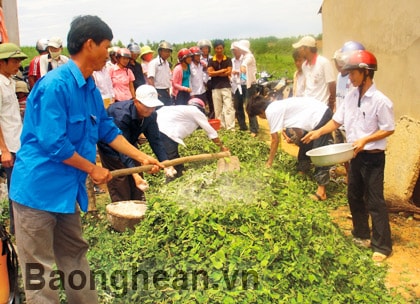Replicating the model of producing microbial organic fertilizers
(Baonghean) - From 2006 to 2008, with the approval of the Provincial People's Committee, the Department of Science and Technology, and the support of the Ministry of Science and Technology and the Office of the Rural and Mountainous Areas Program, the Nghe An Center for Application of Science and Technology Advances implemented the project: "Building a model for producing organic microbial fertilizers from agricultural by-products in Nghe An province".
After 2 years of implementation, the project was approved and ranked excellent by the State Council. The project was successful, the center's staff mastered the technology to produce Compost Maker biological products with a capacity of 100 tons/year, basically meeting the demand for producing organic fertilizers from agricultural by-products. This type of fertilizer has the ability to decompose cellulose, microorganisms synthesize plant growth stimulants and inhibit microorganisms that cause diseases in the root zone of crops, especially diseases caused by Fusarium fungi, Aspergillus niger and bacteria that cause wilt on eggplants. Shorten the time to process by-products, after 1-2 days of incubation, the temperature of the compost mass begins to increase and reaches a maximum of 45-70oC after 7-15 days and after 30-35 days of use in the field. The project also promotes the collection and treatment of agricultural by-products to clean the living environment and improve the soil. In addition, the project has helped people proactively produce organic microbial fertilizers on the spot. With an investment of only 400,000 VND to 600,000 VND, people can produce 1 ton of organic microbial fertilizer, while the price of 1 ton of microbial fertilizer of equivalent quality on the market is at least 2,000,000 VND.

Instructions for the production process of biofertilizer in Tan Ky
With the superiority of the product, the project using Compost Maker to produce household-scale microbial fertilizer was awarded the Second Prize for Creative Labor in Science and Technology by the Provincial People's Committee and the Vietnam General Confederation of Labor awarded the Creative Labor Certificate in 2010.
After acceptance, the project continued to expand. By October 2012, the center had trained dozens of classes on the process of producing organic microbial fertilizers and produced nearly 50 tons of products and hundreds of thousands of tons of fertilizers. Compost Maker products were highly appreciated and the effectiveness of fertilizer use was recognized by people and farmers' associations and a support program was proposed to be recommended for expansion. The unit consulted and the Department of Science and Technology submitted to the Provincial People's Council and was approved by the Provincial People's Committee for the Policy to support training and purchase of Compost Maker biological products to produce organic biological fertilizers from agricultural by-products according to Decision No. 16/2012/QD-UB dated February 17, 2012. Accordingly, the level of support for purchasing products is from 50-70% depending on the plain or mountainous area; The support period is 3 years, starting from 2012. Up to now, 5 districts have registered with the quantity of over 30 tons of preparations for 2012 and many districts have registered dozens of tons of preparations and dozens of training courses for 2013. Typically, Anh Son district has registered 9 tons of preparations and 12 training courses. This is the first "Science Promotion" policy in the province, also one of the very few policies on supporting science and technology in the whole country and is one of the most successful of the project.
With the results achieved, it is hoped that the agencies and sectors will continue to create favorable conditions to support research to perfect the carrier to replace peat in the production of Copost Maker biological products to facilitate the transportation process; support research projects to supplement different functional microorganisms for crops, plant protection microorganisms, environmental treatment microorganisms (treatment of aquaculture ponds, treatment of pesticide residues in soil, etc.); continue to expand models from successful and effective topics and projects, thereby having support policies for people to improve productivity and product quality to gradually improve the economic life of the people.
MSc. Pham Hong Hai
